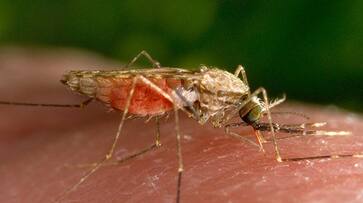A study by scientists from the Sustainability Solutions Research Lab at the University of Pannonia and funded by the Hungarian government opined that India’s ancient medical system helped fight against diseases like malaria thousands of years ago
Bengaluru: In a great corroboration that Indian Ayurvedic science is effective against malaria, a study by scientists from the Sustainability Solutions Research Lab at the University of Pannonia and funded by the Hungarian government opined that India’s ancient medical system helped fight against diseases like malaria thousands of years ago, as reported by The Times of India.

“The malarial parasite in prehistoric India is likely to have been the more benign variant. Nor should we forget that India’s own medical system was able to take up the fight against diseases thousands of years ago, while in other malaria-affected areas of the world, a similarly effective, Ayurveda-like medicine system did not exist,” said Dr Attila J Trájer, lead author of the study published.
The study tried to answer why the ancient humans preferred dry and arid areas. The study included 449 archeological sites, including 94 sites in India, to understand the factors that determined settlement and migration patterns out of Africa.
Malaria-carrying mosquitoes have appeared between 28.4 and 23 million years ago, long before humans had entered South Asia which occurred around 60,000 to 70,000 years ago.
“At this moment, two parasites, Plasmodium falciparum and Plasmodium vivax, caused 40-60 per cent of the malaria cases in India. In the past, before the Neolithic Revolution (about 12,000 years ago), the more benign vivax malaria may have been the dominant form in Indian peninsula. The more severe falciparum may have been absent from the subcontinent,” a lead author of the study said.
Malaria and its consequences:
As reported by World Health Organisation,
- In 2019, there were an estimated 229 million cases of malaria worldwide.
- The estimated number of malaria deaths stood at 409 000 in 2019.
- Children aged under 5 years are the most vulnerable group affected by malaria; in 2019, they accounted for 67% (274 000) of all malaria deaths worldwide.
- The WHO African Region carries a disproportionately high share of the global malaria burden. In 2019, the region was home to 94% of malaria cases and deaths.
- Total funding for malaria control and elimination reached an estimated US$ 3 billion in 2019. Contributions from governments of endemic countries amounted to US$ 900 million, representing 31% of total funding.
Last Updated Jan 6, 2021, 7:09 PM IST









![Salman Khan sets stage on fire for Anant Ambani, Radhika Merchant pre-wedding festivities [WATCH] ATG](https://static-gi.asianetnews.com/images/01hr1hh8y86gvb4kbqgnyhc0w0/whatsapp-image-2024-03-03-at-12-24-37-pm_100x60xt.jpg)
![Pregnant Deepika Padukone dances with Ranveer Singh at Anant Ambani, Radhika Merchant pre-wedding bash [WATCH] ATG](https://static-gi.asianetnews.com/images/01hr1ffyd3nzqzgm6ba0k87vr8/whatsapp-image-2024-03-03-at-11-45-35-am_100x60xt.jpg)


